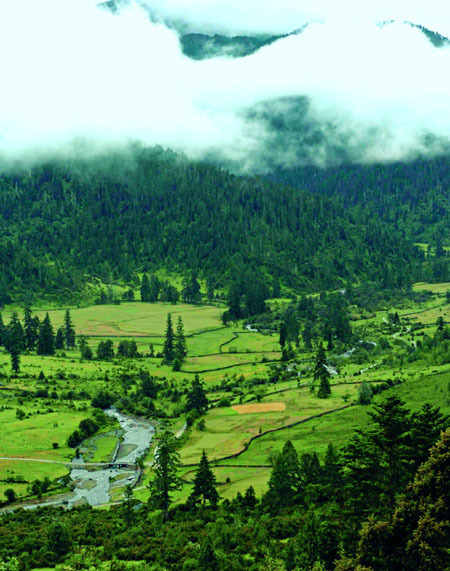| In 2006, a total of 362 million Yuan was invested in forestry construction. The accumulated forestation area reached 20,100 hectares, among which 904.3 hectares were planted in Lhasa and surrounding areas, 166.6 hectares were planted for sand control, 3,556.7 hectares were planted on barren hills and wasteland, 5,242.5 hectares of forest for ecological benefits were recovered, 4,310.9 hectares were planted by voluntary tree-planting activities, 1,633.9 hectares of economic forest were planted, and 1,164.9 hectares were reforested. Some 1.76 million hectares were created by closing off hillsides for forestation, and 201.2 hectares of seedlings were cultivated. About 85 percent of the planted trees survived.
The construction of the key forestry projects has been steadily promoted. The project for the protection of natural forests, with the investment of 23 million Yuan granted by the State, has been implemented in the three counties of Jomda, Gonjo and Markam of Qamdo Prefecture. This project has completed planting 1,342 hectares of forest for ecological benefits, newly added seven hectares for growing seedlings, and produced more than 1.2 million seedlings of different kinds. Central Government compensatory funds for eco-forestry efficiency further expanded the range of compensation. The second group of Central Government compensatory funds for eco-forestry efficiency launched in 2006 involved the area of 1.2446 million hectares, and 163.34 million Yuan has been used. Since the project was implemented, 2.1779 million hectares of key forests for ecological benefits in Tibet have been conserved effectively.

Scenery in Nyingchi rivals area south of the Yangtze River in China.
Tibet has also strengthened the management and protection of the projects to restore farmland to forest. In 2006, the State arranged an additional task of 10,000 hectares to Tibet, which was assigned to various prefectures (cities) and counties, with the investment totaling 65 million Yuan all the year. In addition, Tibet has reinforced the construction of high-quality seed and seed-collecting bases, with the total all-year investment of 15.37 million Yuan, thus laying a solid foundation for Tibet's forestation with high-quality seeds and bases. While making a good job of the ecological construction through the aforementioned projects in 2006, Tibet also brought created income of more than 120 million Yuan to local farmers and herders, thus greatly mobilizing their enthusiasm for participating in forestry ecological protection and construction.
In the meantime, the TAR promulgated and implemented the Measures for Implementing the Forest Law. In 2006, it strengthened the cleaning off and harnessing of the source, and marketing of forest resources, reinforced management over the species of endangered wild animals and plants, and severely cracked down on the crimes destroying the forest and wild animals and plants. According to statistics, 30 cases of various kinds were handled in the whole region, with 58 persons violating various forest laws being punished, thus retrieving economic losses of 160,000 Yuan for the State. A total of 13 forest fires took place in the whole region, including two common forest fires and 11 forest fire alarms, with the burned area and the area of affected forest reaching 194.12 hectares and 55.62 hectares, respectively. Compared with 2005, the number of the fires was reduced by 23.5 percent, but the burned area and the area of affected forest both increased to some extent.
|





